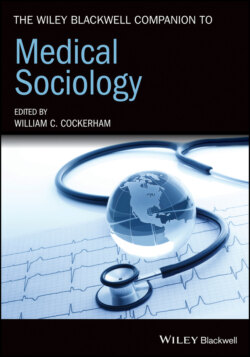Читать книгу The Wiley Blackwell Companion to Medical Sociology - Группа авторов - Страница 24
2 Medical Sociology and Sociological Theory
ОглавлениеWILLIAM C. COCKERHAM AND GRAHAM SCAMBLER
The link between medical sociology and sociological theory is crucial to the subdiscipline. Theory binds medical sociology to the larger discipline of sociology more extensively than any other aspect of the sociological enterprise. Sociological theory is also what usually distinguishes research in medical sociology from socially oriented studies in allied fields, like public health, epidemiology, and health services research. Whereas seminal sociological contributions in quantitative and qualitative data collection and analysis, along with many fundamental concepts of social behavior, have been adopted by multidisciplinary approaches in several fields, sociological theory allows medical sociology to remain unique among the health-related social and behavioral sciences. This could be considered somewhat surprising because medical sociology has often been described in the past as atheoretical. It is true that much of the work in the field historically has been applied to practical problems rather than theoretical questions. That is, it was intended to help solve a clinical problem or policy issue, rather than develop theory or utilize it as a tool to enhance understanding.
Medical sociology was not established until after World War II when the American government provided extensive funding through the National Institutes of Health for joint sociological and medical research projects. The same situation prevailed in Western Europe, where, unlike in the US, few medical sociologists were affiliated with university sociology faculties and connections to the general discipline of sociology were especially weak (Claus 1982; Cockerham 1983). It was primarily through the stimulus of the availability of government funding that sociologists and health professionals embraced medical sociology as a new subdiscipline. Funding agencies were not interested in theoretical work, but sponsored research that had some practical utility in postwar society as Western governments had come to realize that social factors were important for health.
By the end of the twentieth century, however, this situation had changed significantly. Most research in medical sociology remains oriented toward practical problem solving, but the use of sociological theory in this endeavor is now widespread. There has been a general evolution of work in medical sociology that combines both applied and theoretical perspectives, with the utilization of theory becoming increasingly common as a framework for explaining or predicting health-related social behavior. At the same time, medical sociology moved away from a state of dependence upon medicine for defining and guiding research agendas to a position of relative independence. Although the relationship between medical sociology and medicine has been important, it has not always been harmonious. Medical sociology tended to side with patients and call attention to instances of poor medical care, while some physicians have been contemptuous of medical sociologists in clinical settings. Yet medicine nurtured, funded, sponsored, and even named medical sociology early in its development and continues to do so today (Cockerham 2021). In fact, one could arguably state that medicine has supported medical sociology with funding, jobs, and research opportunities to a much greater extent than sociology. It can also be claimed that the increased use of theory in medical sociology represents more of an effort on the part of medical sociologists to establish and reinforce links to the parent discipline than vice versa. In many ways, medicine has been a better ally of medical sociology than sociology.
While medical sociology is moving closer to sociology, it has generally removed itself from a subordinate position to medicine. There are four reasons for this development. First, the shift from acute or infectious to chronic diseases as the primary causes of death in contemporary societies has made medical sociology increasingly important to medicine. This is because of the key roles of social behavior and living conditions in the prevention, onset, and course of chronic disorders. Previously, these social determinants were not considered prime causes of infectious diseases, but it appears this view is also changing as seen in social factors relevant to the origin and spread of the COVID-19 global pandemic (Abrams and Szefler 2020). Second, medical sociology has moved into a greater partnership with medicine as it has matured and fostered a significant body of research literature, much of it relevant to clinical medicine and health policy. Third, success in research has promoted the professional status of medical sociologists, in relation to both medicine and sociology. And fourth, medical sociology has generally set its own research agenda, which includes medical practice and health policy as an object of study. In doing so, medical sociologists have established themselves as objective professionals.
The movement of medical sociology toward greater connections with general sociology reflects the desire of a mature subdiscipline to expand its analytic capabilities and reinforce its potential. Changing social conditions associated with the transition in society from the postindustrial age to today’s late modern period requires all of sociology to account for altered realities and formulate new concepts. This situation suggests that not only is medical sociology connecting with general sociology, but that sociology is moving toward a closer affiliation with it – given the considerations of health increasingly evident in the everyday social lives of people and medical sociology’s capacity for explaining it. Under the current conditions of social change, medical sociologists are making greater use of sociological theory because theory promotes the explanatory power of their empirical findings. This development has led some to suggest that medical sociology may indeed prove to be the “leading edge” in some areas of the development of contemporary theory (Cockerham 2013a, 2021; Turner 1992). The extent to which this assertion will be fully realized is not yet certain, but it is clear that a considerable amount of theoretical work is taking place in medical sociology (Cockerham 2013a, 2013b, 2021a, 2021b; Collyer 2015; Conrad 2007, 2013; De Maio 2010; Link and Phelan 1995; Phelan and Link 2013; Scambler 2012, 2018). The remainder of this chapter will provide an overview of the field with respect to theory.
